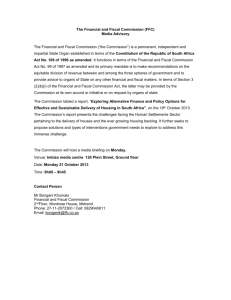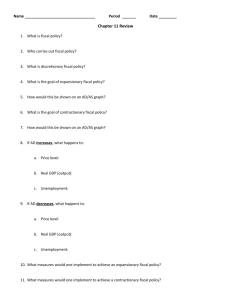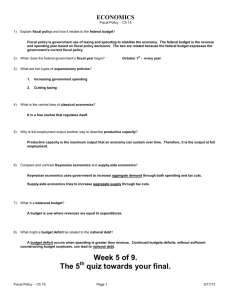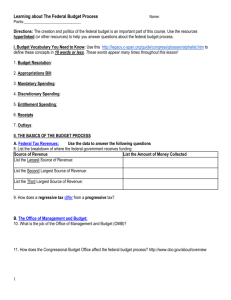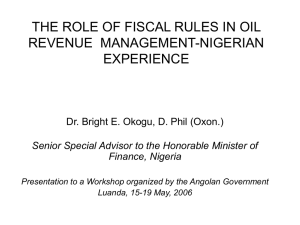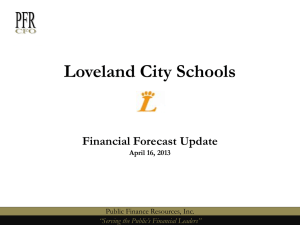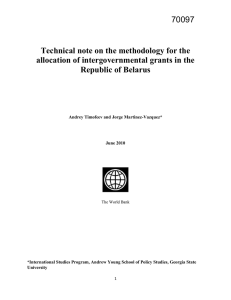Budget rules
advertisement
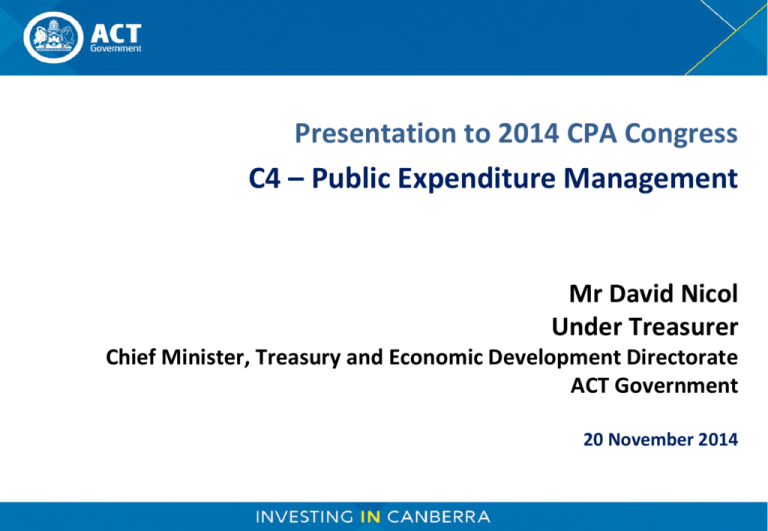
Presentation to 2014 CPA Congress C4 – Public Expenditure Management Mr David Nicol Under Treasurer Chief Minister, Treasury and Economic Development Directorate ACT Government 20 November 2014 Presentation outline o What is expenditure management control? o Why do government’s need do it? o Fiscal rules. o How is it done? o How could it be done better? o What role can the accounting profession play in expenditure management control? What is expenditure management control? A broad view: ensuring that actual spending of public resources matches the priorities of the community. A narrow view: identifying lower priority government spending for reallocation to other uses. Also known as: fiscal consolidation, budget cuts, savings, fiscal repair, etc. Why do government’s need do it? oResources are finite. oPriorities change. oEconomic and other circumstances change. oPrincipal/agent problem. oCan aid efficient and effective use of public resources. Fiscal rules o Most governments/parliaments now adopt/impose fiscal rules. o Fiscal rules typically specify limits on the size of deficits/net debt ratios, but can also impose limits in other areas such as on taxation. o Have been introduced as an attempt to place restrictions on a present day government’s ability to impose obligation on future generations. o Two general approaches: Strict fiscal rules (eg Maastricht treaty); Fiscal frameworks (used in Australia). o Alternative/accompanying mechanisms: transparency, independent audit processes, ‘Independent Budget agency’? How is it done? Methods have been broad and varied. Some of the more common: o Responding to a fiscal crisis. o Audit commissions. o Savings rounds. o Efficiency dividends. o Efficiency audits. o Self nomination/targets/envelopes. o Budget rules. o Alternate delivery models. o Reviews. How is it done? Responding to a fiscal crisis o Can be caused by external exogenous events or caused by the discovery of discovered fiscal problems. o Often used as a trigger for governments to apply other methods of expenditure control. o Can provide important political, community and bureaucratic effort and support to identify and implement expenditure control measures. How is it done? Audit Commissions o Often implemented by incoming Governments at both State and Federal levels. o Usually combines the authority of an external, high level, steering/decision making group with that of officials involved in budgetary control. o Often short/sharp exercises, completed in a short timeframe. o Can be either external or internal to Government. o Often put forward controversial/radical ideas and proposals. How is it done? Savings rounds o Specific exercises undertaken by a Government to consider and announce savings, reductions or efficiencies in existing programs/activities. o Can occur through a normal budget process, or part of a mini-budget. o Proposals can be developed by line agencies, central agencies or in partnership. How is it done? Efficiency dividends o Equivalent to an across the board reduction in resources allocated to one or more agencies in a government. o Can be ad-hoc, regular or ongoing. o Can be applied to certain types of expenses or programs or across the board. How is it done? Efficiency audits o Specific reviews focussed on finding less costly ways of achieving existing outcomes or practices. o Often involve a whole of government perspective. o Usually looks at input costs, process improvement, behavioural change, demand management, wastage of resources etc. o Usually involves benchmarking activities and assessment of best practice. o Examples include: the Gershon Review of ICT spending at the Commonwealth level. How is it done? Self nomination/targets o Governments can place the burden on line ministries to identify and propose savings. o Can be accompanied by a savings target for either the quantum of proposals brought forward for consideration or achieved. How is it done? Budget rules o Budget rules are used to manage the ongoing fiscal task of governments. o Generally aim to control new spending and seek to offset new spending with reductions elsewhere in a Budget. o Subject to gaming and require political will to enforce. How is it done? Alternative delivery models o Involve a radical change to delivery of government services (eg move from public sector provision to private sector provision). o May be proposals that come out of the other processes of expenditure management control. o Can change the principle/agent dynamic. o Can generate innovative ideas that lead to better outcomes at lower cost. How is it done? Reviews o Good practice would see public sector programs/activities subject to regular review. o Reviews should incorporate assessments of appropriateness, effectiveness and efficiency. Outcomes from robust assessments can aid in expenditure management control. Reviews can be either be solely program focused, or programs assessed in a broader discal perspective – ie with a view to identifying savings. How could it be done better? oIf I knew a way...... oImproving transparency and financial and performance information is vital oAvoiding the problem in the first place (not always possible) oImportance of inculcating a culture of achieving value for money in public sector workforces oRewarding good behaviour? The role of the accounting profession oChampioning transparency and accuracy of financial information and reporting. oDevelopment of meaningful performance information. oIdentifying and showcasing good practice across agencies. oPromoting a culture of good financial management and value for money across the public sector. oDeveloping innovative solutions when addressing demands for new policy and management of ongoing policy.

